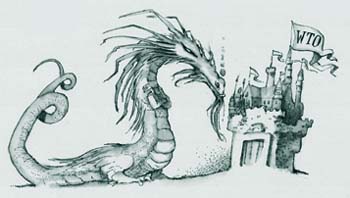- Economics
- International Affairs
- Law & Policy
- Civil Rights & Race
 Illustration by William Bramhall Illustration by William Bramhall |
Both President Clinton and Premier Zhu Rongji had hoped to announce a deal to usher China into the World Trade Organization during Mr. Rongji’s visit to Washington last April, but it was not to be. The economic significance of this postponement is actually minimal, whereas its political significance, although possibly large, is largely inscrutable.
Notwithstanding its absence from the WTO, formed five years ago, China’s economic performance has been among the strongest in Asia and indeed in the world. Even allowing for the sometimes fuzzy character of China’s statistics, the economic indicators are impressive. With gross domestic product growing annually by 6 to 7 percent, China is now the world’s second- or fourth-largest national economy, depending on whether one looks at purchasing power parity or nominal exchange rates. Exports and imports in 1998 were $270 billion and $140 billion, respectively, making China the world’s tenth-largest trading economy. Its current account surplus is more than $25 billion, foreign direct capital inflows are more than $35 billion annually, and foreign exchange reserves are $150 billion (the world’s second largest, after Japan). To assert, as some do, that China needs to join the WTO to be a full participant in the world economy is absurd. China already is!
This is not to deny or minimize the fundamental and serious problems confronting China: its large, costly, and inefficient state-owned enterprises; a banking system whose balance sheets are dominated by nonperforming debt; and a perverse system of credit allocation that offers credit bailouts to inefficient state enterprises while slighting dynamic, privately owned companies. Clearly, China needs a more level playing field where nonstate enterprises—including foreign and joint ventures—can fairly compete for credit. Beijing also needs to do more to protect tangible and intellectual property rights.
A recent RAND study that measured economic “openness”—defined as a lack of barriers to foreign businesses entering domestic markets—found China ranked almost equally low with Japan, a WTO member. Both were far below the United States and Germany and, based on some measurements, even below Korea. Whether China is outside or inside the WTO, it needs to open its domestic markets to foreign competition if it is to sustain its economic progress in the coming years. Admitting China to the WTO will at best provide only a modest extra impetus for Beijing to move forward in this regard.
It can be argued, of course, that even if delaying China’s entry into the WTO will do no economic harm, it may have severe political repercussions. The leverage of pro-reform leaders like Zhu Rongji may be enhanced by early WTO membership, thereby contributing to further progress in economic reform and openness. Yet it can as readily be contended that deferred admission may galvanize policy efforts within China directed toward more rapid reform and opening of the economy.
Then there is the damage that the spat over Chinese membership in the WTO may do to U.S.-China relations. During lengthy negotiations, China failed to make concessions demanded by U.S. trade negotiators on behalf of several economically and politically powerful industries, principally insurance, telecommunications, financial services, and aviation. U.S. negotiators judged that China’s previous concessions were not enough. Clearly the Chinese are upset about this. Yet it can be just as plausibly argued that were either China or the United States quickly to cave in on these issues, there would be a political backlash in both countries that would hurt U.S.-China relations far more than any delays in WTO entry.
Perhaps the real loser in this negotiation is Taiwan. Unlike the mainland, Taiwan has already complied with virtually all conditions to qualify for WTO membership as a “customs territory” (analogous to Hong Kong’s status in the organization) and has secured agreements to this effect with most WTO members. But the informal consensus among the members, and between China and the United States, is that WTO membership for China and Taiwan will be virtually simultaneous. Hence, deferral of China’s admission probably ensures that Taiwan’s admission will also be delayed, despite its having met WTO conditions and despite its pervasively open economy.
The good news is that Taiwan, no less than the China mainland, can continue to expand and enhance its impressive economic performance internationally and domestically, even as WTO admission languishes. Admission to WTO is not a prerequisite for any nation’s economic progress.







